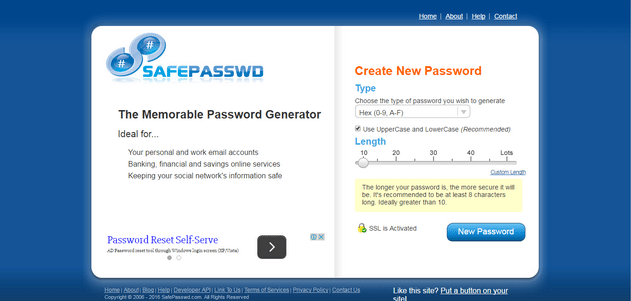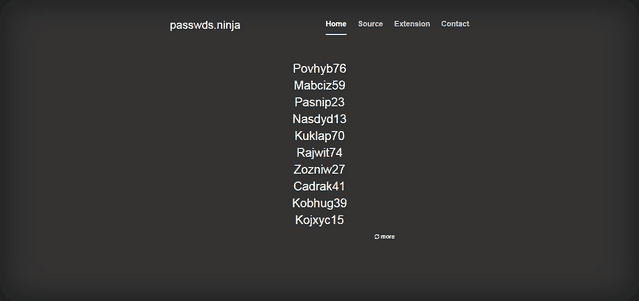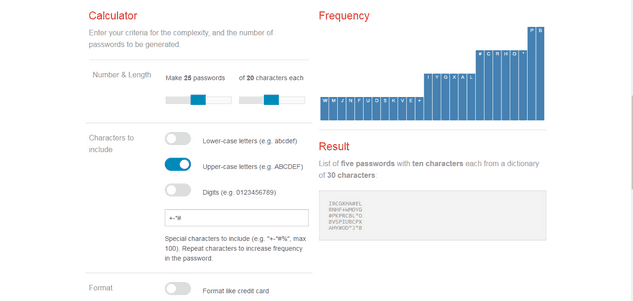What is a Complex Password Generator?
A Random Password Generator refers to a software program, online, or hardware devices able to automatically yield a password. Usually, a strong complex password is not always easy to remember. But how can I have strong easy to remember password generator. This Article explans how our password generator helps you to make generate strong passwords.
It uses parameters that users set, like numbers, length, symbols, pronounceability, and mixed-case letters. An effective random password generator can yield strong passwords using safe technology with built-in randomness and alter guidelines to fit distinct sites’ special password requirements. It also integrates into a password manager like Dashlane, creating managing and easily using all your strong passwords. A typical random password generator would look like this:
Password
c4hz2KvD=H
|
Include Lower Case (a-z) Include Upper Case (A-Z) Include Numbers (0-9) Include Symbols (!"#$%&'()*+,-./:;<=>?@[\]^_`{|}~) Exclude Ambiguous Characters (iIl1L| o0O `'-_":;.,) Exclude Brackets (<>()[]{}) No Repeated Characters |
Notably, not all complex password generators generate genuinely random outcomes. If you use a generic random password generator to create over 5,000 new passwords, these passwords you generate are the outcome of an occurrence called pseudo-random. You might be tempted to question the safety of the passwords if they are not truly random. If this is the case, they are still safe. Most random password generators use cryptographic functions like the hash or bloc ciphers to prevent cryptanalytic, state compromise extension, or input-based attacks. Below are examples of passwords generated by Dashlane:
- BP#/P-pQ8p2_
- Z9tOh|ES*GOX
- 1b-‘$W^$)e/I
- q8uQPjgyzp%:
- [“cB6}%gvl~a
what is the best random password gen?
There are many password generator tools available online such as SafePasswd, TechZoom etc. However, none of these have the best criteria for generating useful yet strong passwords. Certainly, you dont need a password that is full of random characters with no meaning. As such, our password tool allows you to genreate strong yet easy to remember passwords.
how to make strong easy to remember passwords
You can try find any trends of patterns common to these examples. However, none exists because they are randomly generated passwords that are not truly random as they may appear. According to Professor Steve Ward of MIT’s Computer Science and Artificial Intelligence Laboratory, conventional computer systems are carefully and specifically programmed to eliminate randomness in outcomes. Therefore, your randomized passwords are not truly random as they are created by a similar algorithm.
Password Strength
Password strength is a measure of a password’s effectiveness against brute-force attacks or guesswork. Although it tends to vary, password strength estimates how many trials are necessary on average for you to successfully guess the password. It is influenced by the password’s complexity, unpredictability, and length. Apart from the actual password, appropriate security controls significantly reduce security breach risks. These controls include safeguards put in place to detect, minimize, or avoid security risks. You probably have come across controls like the two-step authentication for your mobile phone, email, or WhatsApp passwords. Once a given number of failed attempts has been reached, the account automatically locks for some time.
How Do You Generate Strong, random password gen?
In today’s technologically advanced era, everyone has different devices like laptops, iPads, smartphones, and desktop computers. Since no one prefers their personal information to be stolen, they put passwords to safeguard everything they use. Generating strong, random passwords gen helps you protect against conventional password attacks. Recent studies reveal that over 80% of hacking-associated breaches occur due to stolen or weak passwords. For you to generate strong, random passwords, you must:
- Refrain from using personally identifiable information like street addresses, names, ID card numbers, postcodes, and birthdays. These may be easy to remember, but also easily found online and should thus be avoided at all costs in passwords to guarantee greater strength.
- Ensure that you do not recycle past passwords, especially if your account has been breached before.
- Ensure you use at least 12 to 16 characters, with at least one number, one uppercase letter, one lowercase letter and a special symbol.
- Refrain from letting your Web browsers like Chrome, Opera, Microsoft Edge, and FireFox store your passwords, as all saved in the browsers can be revealed easily. You might be tempted to do so because it prevents your account from being locked if you forget your passwords, but it is advisable never to do allow.
- Not log in to important accounts on someone else’s computer, or when connecting to a public Wi-Fi hotspot, web proxy, or free VPN.
- Change your passwords when you have reason to, like after sharing them with someone, or following a website breach.
- Consider using emoticons if you desire to add symbols to your passwords without making the hard to recall. Emoticons are the coded versions of emojis and constitute letters, punctuations, and/or numbers. Examples of some emoticons you can consider are:

Why is Randomness Important?
One of the most common attack vectors on passwords is using common English words that most individuals have used previously. It usually occurs when attackers guess common dictionary words’ combinations to try gain access to your account. That is why the best and most effective passwords include random mixtures of symbols, numbers, words, and characters. Secure passwords also incorporate upper- and lower-case letters and are at least twelve characters long.
Types of Strong, Random 1Password Generators
Millions of individuals across the globe use social media platforms like Twitter, Instagram, Facebook, MySpace, and LinkedIn. You might have been tempted to use or use the same password for all your accounts. It can be very risky once hackers figure out the trend. Below are some strong random password generator tools that can safeguard you from online attacks.
SafePasswd

You will realize that apart form the typical letters and/or numbers, this generator uses the HEX option constituting 0-9 and/or A-F. You can opt for the ‘easy to remember’ choice and one or two words with a few numbers in between will be used.
Password Ninja

The tool works efficiently and you do not have options to choose from, like in SafePasswd. You simply click on the button and ten passwords are yielded. They are likely to meet the criteria for any site requiring a password since they all start with a capital letter and end in two numbers.
TechZoom Password Generator

TechZoom random password generator helps you create passwords with the typical options for upper-and lower-case letters, symbols, and numbers. However, unlike other tools, it also formats your choices like credit card numbers. It is convenient, but you must use 14 to 16 characters for it to appear to be a credit card number. If you use all numbers, it will not appear as so.
There are many other strong, random password generator tools offering distinct variations to assist you choose the most appropriate password. Do not allow yourself to be lazy and pick the easiest passwords because the risks involved are just not worth it.